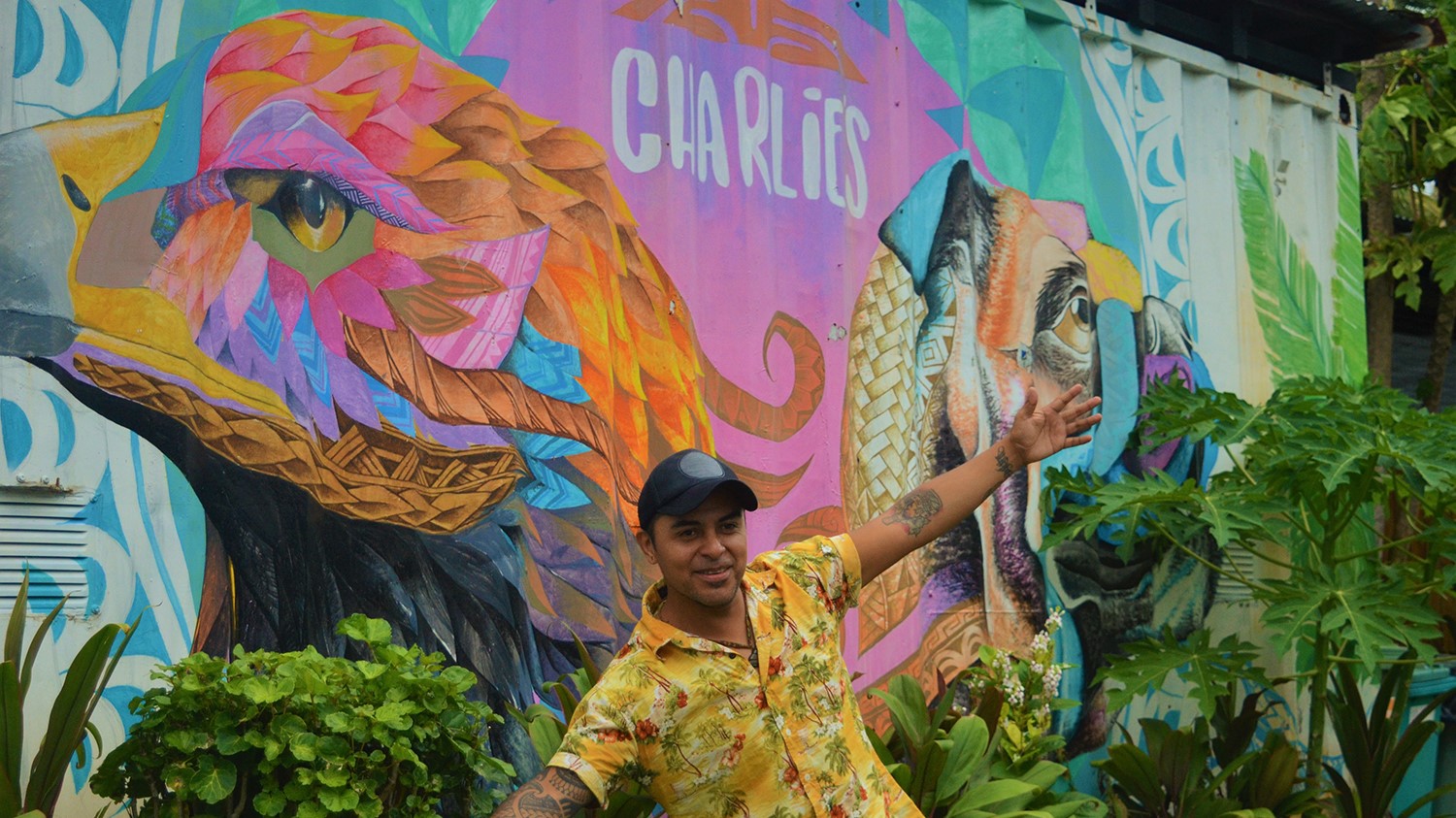Inspiring conservation through the use of art
Saturday 19 February 2022 | Written by Te Ipukarea Society | Published in On the Street, Opinion

Gonzalo Aldana standing outside the popular family business ‘Charlie’s’ with the mural he painted, representing the idea of family and union. 21050731
Outdoor murals or sculptures provide a creative opportunity to engage the public in clever designs but also provide people with underlying messages.
The neat thing about art is that it is its own language, it has no boundaries, and therefore is open to your own personal interpretation of what the art piece means to you.
Some outdoor murals, particularly those that have a conservation message linked to them, are created to instill positive behavioral changes amongst people. A classic example is a life-size whale made of recycled plastic in California, created to educate people about ocean pollution. The mural has overall allowed people to interact with the sculpture and experience the issue of ocean pollution at scale.
A similar vision is in the pipeline for Rarotonga but will target how plastic and glass waste can be repurposed.
To assist us with the creative juices, TIS reached out to Pouarii Tanner who has a background in Pacific arts. Upon visiting Pou’s house to discuss possible outdoor mural designs, it was clear that we had the right designer for the job. The lounge/entertainment area where we discussed ideas had a built-in salvaged catamaran that had washed up on the reef in Mauke some time ago. The 17m long fiberglass catamaran named ‘Ann’ from New Mexico used to travel across the Pacific. Unfortunately, it’s run-in with the reef left it too damaged to sail again. Fortunately, the Ann lives on thanks to the creative talent from Pouarii’ s husband Sam, where the hull has been flipped and is now a storage area and soon to be library.
Pou’s talent in creative arts got us thinking about our current plastic waste issue, and how we can find innovative ways to reuse this resilient, durable waste product. One massive problem here in the Cook Islands is plastic waste. Its light, lasts forever and is typically only used once before being thrown away, ending up in the landfill or our ocean.
One innovative solution to reusing plastics involves the creation of plastic eco-bricks, where hard and soft plastics are crammed into plastic bottles and used as blocks for construction purposes. To ensure the strength of the structure is acceptable, each eco brick, depending on the size of the bottle, needs to weigh a certain amount. For example, a 1.5L bottle must weigh at least 500g, once filled with plastic pieces. To bind the eco-bricks together cement will be used but with a twist. The sand component of the cement ratio mix will be replaced with crushed glass. Sand for construction is becoming a rare commodity here in Rarotonga and Aitutaki due to increased development. Glass is made up of around 75 per cent sand and our landfill receives a lot of glass bottles which are then crushed and just waiting to be used.
To demonstrate ways on how the crushed glass can be repurposed as well as the plastic eco-bricks, the creative arts team considered the idea of creating an outdoor lounge suit, a two-seater couch, perhaps an outdoor table or a raised garden bed.
The next piece of the project pie involves making enough ecobricks to build the final concept design. For example, a two-seater lounge suite will need 125 ecobricks all of the same size. That’s 62.5kg of plastic waste being diverted from ending up in the landfill or many thousands of pieces of plastic waste being repurposed in the form of art.
The creative arts construction team is to trial a pilot concept creating a raised garden for the TIS office. All lessons from the pilot design will then help guide the larger outdoor lounge suite design.
If you would like to contribute by supplying ecobricks to the project, please drop into the TIS office or call us on 21144 for the guidelines to follow, e.g. only clean dry plastic to be used, etc.




































